|
|
|
Sort Order |
|
|
|
Items / Page
|
|
|
|
|
|
|
| Srl | Item |
| 1 |
ID:
103217
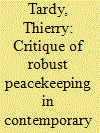

|
|
|
|
|
| Publication |
2011.
|
| Summary/Abstract |
The concept of robust peacekeeping emerged in response to the failures of the UN in Rwanda and Bosnia and Herzegovina, where peacekeepers were passive witnesses of massive violations to human rights, allegedly because they were not 'robust enough'. Although robust peacekeeping is not a new concept and has been partially implemented in some operations (Sierra Leone, Democratic Republic of Congo, Haiti, Lebanon), it attracted renewed attention in 2008-10 with developments in its conceptualization. While it recognizes the necessity and virtue of a robust approach as a protection mechanism for peacekeepers, this article questions the extent to which robust peacekeeping is politically acceptable and operationally viable. Beyond the doctrinal difficulty of ensuring compatibility of robustness with the principles of peace operations, robust peacekeeping is directly challenged by the perennial constraints of contemporary peace operations, such as weak political support, the erratic availability and quality of troops, and the reticence of troop contributors to embrace a robust approach. Overall, while robustness is presented as a solution to the 'credibility gap' that the UN faces, its relevance in the light of these problems is dubious.
|
|
|
|
|
|
|
|
|
|
|
|
|
|
|
|
| 2 |
ID:
160084
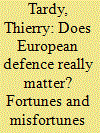

|
|
|
|
|
| Summary/Abstract |
This article examines how the defence component of the Common Security and Defence Policy (CSDP) has been revisited over the last few years. It argues that while the CSDP has grown predominantly as a security – rather than defence – policy, the latest developments that include the creation of a military headquarter, the launching of a Permanent Structured Cooperation (PESCO) and the new role for the European Commission in defence funding, attest to an evolution towards a more central EU defence policy. In the meantime, the article points to some structural impediments to the materialisation of European defence. The momentum says little about the form and finality of military operations that EU states will have to conduct so as to give a meaning to defence in a European context. Moreover, persisting divergences in the EU member states’ respective strategic cultures and institutional preferences – notably vis-à-vis NATO – are likely to continue to constrain European defence self-assertion.
|
|
|
|
|
|
|
|
|
|
|
|
|
|
|
|
| 3 |
ID:
080133
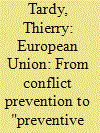

|
|
|
| 4 |
ID:
149276
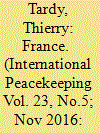

|
|
|
|
|
| Summary/Abstract |
French policy towards UN peacekeeping reflects the ambivalence of what France wants to achieve in the field of conflict management and through which institutional frameworks it prefers to work. On the one hand, France is greatly involved in the design and decision-making process of contemporary UN-led peacekeeping operations. On the other hand, after having been present in the field during the early 1990s, France underwent a major policy shift that led it to distance itself from UN operations. This chapter offers a narrative of French policy and perceptions vis-à-vis the virtues and limits of UN peacekeeping operations in the twenty-first century. It examines the French level of contributions, decision-making process, motivations and lessons learnt from past and current operations. It also analyses the dichotomy between the political role that France plays at the Security Council and its absence from UN-led operations. It seeks to determine how coherent this dichotomy is, its rationale, and how likely – and under what conditions – it will change in the near future, in particular through a hypothetical French return to UN-led peacekeeping operations.
|
|
|
|
|
|
|
|
|
|
|
|
|
|
|
|
| 5 |
ID:
052604
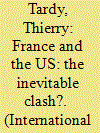

|
|
|
|
|
| Publication |
Winter 2003-04.
|
|
|
|
|
|
|
|
|
|
|
|
|
|
|
|
| 6 |
ID:
171709
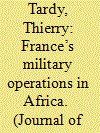

|
|
|
|
|
| Summary/Abstract |
This article examines France’s institutional preferences in the context of its military operations in Africa. It argues that, if France had its multilateral moment in the 1990s and 2000s, it has since become institutionally agnostic. Institutional agnosticism means that France no longer has strong institutional preferences when running military operations; instead, it has over the last six or seven years opted for various frameworks based on a pragmatic analysis of what institutions – the UN, the EU, the G5 Sahel or regional organisations – bring. France is opportunistic as it wants to keep open all options while retaining the right to run unilateral missions. The first part presents the evolution of French military operations over time and how they have become increasingly multilateral after the end of the Cold War. The second part aims to unpack why France has embraced multilateralism, identifying three main issues: multilateralism as burden-sharing, multilateralism as legitimacy provider, and the African continent as a theatre for the operationalisation of the EU’s Common Security and Defence Policy. In the third part, the article looks at why France has become institutionally agnostic and why it continues to run national operations as a consequence of institutional agnosticism.
|
|
|
|
|
|
|
|
|
|
|
|
|
|
|
|
| 7 |
ID:
171706
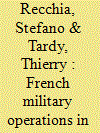

|
|
|
|
|
| Summary/Abstract |
After the end of the Cold War, Paris’s traditional, paternalistic interference in Francophone Africa became increasingly questioned. Partly in response to that, over the last two-and-a-half decades, France’s Africa policy has emphasised multilateral cooperation and local capacity building through the United Nations, the European Union, and various ad hoc multilateral frameworks. This special issue aims to unpack and assess France’s efforts to (a) re-legitimise its military presence on the African continent by securing political endorsements from multilateral bodies; (b) share burdens and liabilities through greater reliance on collective implementation; and (c) re-affirm its own status as a leading power by often spearheading collective military missions.
|
|
|
|
|
|
|
|
|
|
|
|
|
|
|
|
| 8 |
ID:
129038
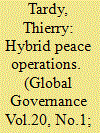

|
|
|
|
|
| Publication |
2014.
|
| Summary/Abstract |
Hybridity is the new term for multidimensional, modular, and multiactor peace operations. Hybrid peace operations bring together several institutions that to an extent cooperate in a joint endeavor. This article aims at unpacking the concept of hybridity by looking at its rationale and challenges. It first examines the typology of peace operations and analyzes the meaning of hybridity. It then looks at why international organizations have hybridized their conflict management policies and contends that further integration is the way forward for legitimacy and efficacy reasons, despite the difficulties encountered by existing hybrid missions. Finally, the article looks at some of the challenges of an increasing integration of institutional actors within peace operations. While integration is a response to the evolution of conflict management needs, it also carries risks ranging from interinstitutional competition to issues of accountability and ownership as well as impacts on the coherence of the global maintenance of international peace and security.
|
|
|
|
|
|
|
|
|
|
|
|
|
|
|
|
| 9 |
ID:
134391
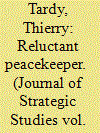

|
|
|
|
|
| Summary/Abstract |
The French doctrine towards peace operations has, over the last two decades, reflected the ambivalence of France’s position, stretched between on the one hand a military culture that places the use of force at the centre of strategy and on the other hand multidimensional operations that by their nature integrate a large range of activities. As a consequence France has evolved as a ‘reluctant peacekeeper’: while it has been significantly involved in peace operations since the end of the Cold War, the military has never felt comfortable with the peacekeeping concept, seen as a dilution of their primary function of fighting wars. This tension has shaped both doctrinal development and operations. Twenty years after the French engagement in former Yugoslavia, lessons have been learnt, and policy-makers have become aware of the evolution of conflict management and the subsequent necessity to integrate the military dimension into a broader framework. Yet France’s policy is still shaped by a certain aversion towards the concept of long-term multinational peace operations, and a parallel preference for more focused and reactive operations. The merits of the use of force are central to these debates. While these policy preferences are responses to legitimate concerns about both the efficiency of foreign interventions and the soldier’s identity, they also raise questions as to their compatibility with the long term and multidimensional requirements of bringing sustainable peace in fragile states.
|
|
|
|
|
|
|
|
|
|
|
|
|
|
|
|
| 10 |
ID:
178612
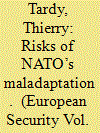

|
|
|
|
|
| Summary/Abstract |
This article deals with the process of adaptation that NATO has gone through over the last decade. It contends that while seeking congruence with its environment, NATO is facing a risk of maladaptation that pertains to its positioning as a defence or security actor. On the one hand, NATO has adapted by going back to the basics of deterrence and defence in the new Cold War context provoked by Russia’s annexation of Crimea; in the meantime though, this move has created tensions for the organisation as it had to simultaneously cope with an increasingly diverse security environment that tends to pull NATO away from a narrow defence-focused agenda. Whether NATO does defence or embraces a broader security agenda reflects dilemmas and trade-offs that are at the heart of the Alliance’s quest for relevance. This article explores NATO’s adaptation since 2014, unpacks the rationale, dilemmas and policy implications of the quest for congruence, and identifies vulnerabilities that the adaptation process may unintentionally lead to.
|
|
|
|
|
|
|
|
|
|
|
|
|
|
|
|
| 11 |
ID:
077206
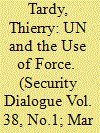

|
|
|
|
|
| Publication |
2007.
|
| Summary/Abstract |
This article addresses the issue of the interaction between the UN and the concept of the use of force, arguing that the UN has, since its inception, suffered from the gap between the theoretical aspects of its mandate regarding the use of force and the reality of international politics. The first part looks at the dual nature of the UN, being the product of both a liberal and a realist approach to international relations, and the way that nature constrains the organization in using force. The second part illustrates the article's theme using the example of peace operations, which are at the heart of the conceptual ambiguity of the UN relationship with the use of force. In the early 1990s, the use of force within peace operations characterized the changing nature of such operations, as well as the gap between idealized peace-keeping and the reality of the field. Finally, the third part sheds light on the way the UN has dealt with recent developments regarding the use of force. Looking at the 'responsibility to protect' and at the Iraq case, it analyses the increasing difficulty for the UN of squaring the principles of its Charter with the evolutions of norms of interventions and threats to international and individual security.
|
|
|
|
|
|
|
|
|
|
|
|
|
|
|
|
| 12 |
ID:
057773
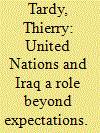

|
|
|
|
|
|
|
|